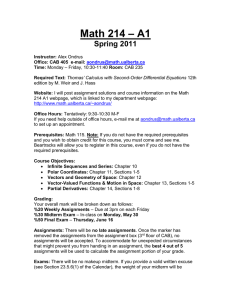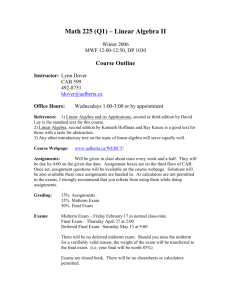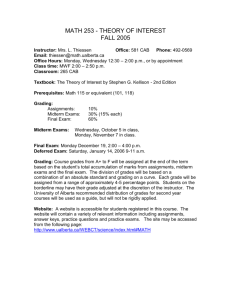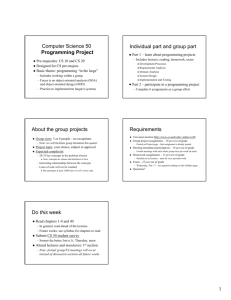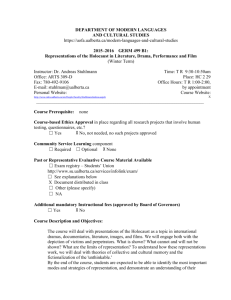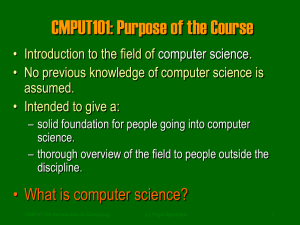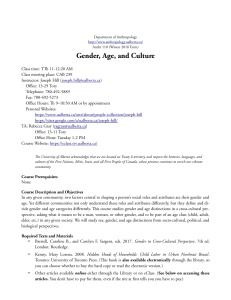Math 222 course outline
advertisement
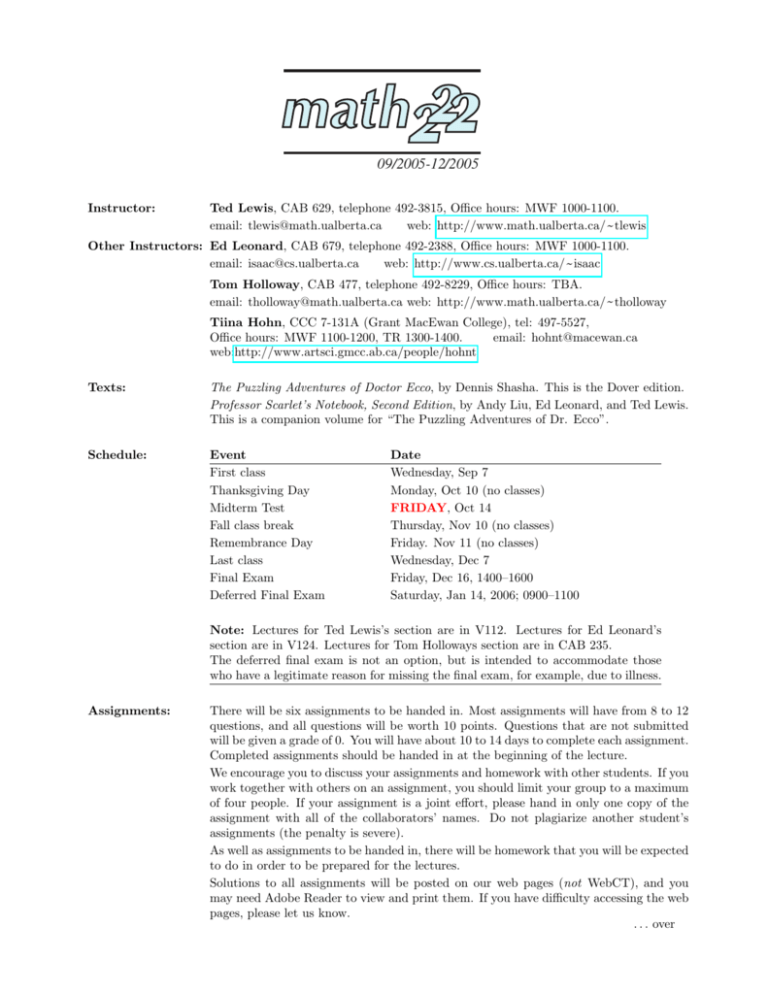
09/2005-12/2005 Instructor: Ted Lewis, CAB 629, telephone 492-3815, Office hours: MWF 1000-1100. email: tlewis@math.ualberta.ca web: http://www.math.ualberta.ca/ tlewis ˜ Other Instructors: Ed Leonard, CAB 679, telephone 492-2388, Office hours: MWF 1000-1100. email: isaac@cs.ualberta.ca web: http://www.cs.ualberta.ca/ isaac ˜ Tom Holloway, CAB 477, telephone 492-8229, Office hours: TBA. email: tholloway@math.ualberta.ca web: http://www.math.ualberta.ca/ tholloway ˜ Tiina Hohn, CCC 7-131A (Grant MacEwan College), tel: 497-5527, Office hours: MWF 1100-1200, TR 1300-1400. email: hohnt@macewan.ca web:http://www.artsci.gmcc.ab.ca/people/hohnt Texts: The Puzzling Adventures of Doctor Ecco, by Dennis Shasha. This is the Dover edition. Professor Scarlet’s Notebook, Second Edition, by Andy Liu, Ed Leonard, and Ted Lewis. This is a companion volume for “The Puzzling Adventures of Dr. Ecco”. Schedule: Event First class Thanksgiving Day Midterm Test Fall class break Remembrance Day Last class Final Exam Deferred Final Exam Date Wednesday, Sep 7 Monday, Oct 10 (no classes) FRIDAY, Oct 14 Thursday, Nov 10 (no classes) Friday. Nov 11 (no classes) Wednesday, Dec 7 Friday, Dec 16, 1400–1600 Saturday, Jan 14, 2006; 0900–1100 Note: Lectures for Ted Lewis’s section are in V112. Lectures for Ed Leonard’s section are in V124. Lectures for Tom Holloways section are in CAB 235. The deferred final exam is not an option, but is intended to accommodate those who have a legitimate reason for missing the final exam, for example, due to illness. Assignments: There will be six assignments to be handed in. Most assignments will have from 8 to 12 questions, and all questions will be worth 10 points. Questions that are not submitted will be given a grade of 0. You will have about 10 to 14 days to complete each assignment. Completed assignments should be handed in at the beginning of the lecture. We encourage you to discuss your assignments and homework with other students. If you work together with others on an assignment, you should limit your group to a maximum of four people. If your assignment is a joint effort, please hand in only one copy of the assignment with all of the collaborators’ names. Do not plagiarize another student’s assignments (the penalty is severe). As well as assignments to be handed in, there will be homework that you will be expected to do in order to be prepared for the lectures. Solutions to all assignments will be posted on our web pages (not WebCT), and you may need Adobe Reader to view and print them. If you have difficulty accessing the web pages, please let us know. . . . over Course summary: The course covers the first six chapters in Scarlet’s Notebook, plus some of the topics from chapter 7. Chapter 1 demonstrates the spirit and background of the course. It is an informal introduction to problem solving. Chapter 2 is a brief introduction to error detecting and error correcting codes and it shows how using a code can often simplify a difficult problem. Chapter 3 is about cryptography—the art of transmitting information while keeping it hidden from kibitzers. Chapter 4 is about recursion and induction. It includes some applications to logical reasoning as well as the typical numerical applications. Chapter 5 shows how graph theory is useful in solving a variety of problems. Chapter 6 is about directed graphs, which are useful for dealing with tournaments and sorting problems. A variety of miscellaneous topics are included in Chapter 7. Marking Breakdown: Grading: Code of Student Behavior: Homework: Midterm test: Final exam: Grade A+ A A− B+ B B− 15% 35% 50% Percent 95 – 100 90 – 94 85 – 89 80 – 84 75 – 79 70 – 74 Grade C+ C C− D+ D F Percent 65 – 69 60 – 64 55 – 59 50 – 54 45 – 49 0 – 44 The University of Alberta is committed to the highest standards of academic integrity and honesty. Students are expected to be familiar with these standards regarding academic honesty and to uphold the policies of the University in this respect. Students are particularly urged to familiarize themselves with the provisions of the Code of Student Behavior and avoid any behavior which could potentially result in suspicion of cheating, plagiarism, misrepresentation of facts and/or participation in an offence. Academic dishonesty is a serious offence and can result in suspension or expulsion from the University. Policy about course outlines can be found in Section 23.4(2) of the University Calendar. Students who require accommodations in this course due to a disability affecting mobility, vision, hearing, learning, or mental or physical health are advised to discuss their needs with Specialized Support and Disability Services, 2-800 Students’ Union Building, 492-3381 (phone) or 492-7269 (TTY).
